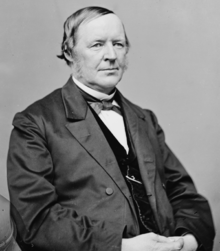Hugh McCulloch
Hugh McCulloch (born December 7, 1808 in Kennebunk ( York County (Maine) ), † May 24, 1895 in Prince George's County ) was an American politician and two-time Treasury Secretary .
Studies and professional career
After training at Bowdoin College , he completed a law degree in Boston , which he graduated in 1833. After admission to the bar, he opened a law firm in Fort Wayne ( Indiana ).
Two years later he became the cashier and manager of the Fort Wayne branch of the Old State Bank of Indiana. He was then President of the New State Bank from 1857 to 1863.
Political career
First currency controller
Although he was an opponent of the National Bank Act of 1862, in 1863 he was appointed Comptroller of the Currency by then Treasury Secretary Salmon P. Chase , an authority under the Treasury that is controlled by that law was first created. During his nearly two-year tenure as currency controller, 868 national banks were approved and no errors were disclosed. He also recommended extensive changes to banking law , which, according to the resulting National Banking Act of 1864, later became the basis of the US national banking system.
Treasury Secretary under Presidents Lincoln and Johnson
His work as Comptroller was so successful, especially because of his influence on existing state banks, that President Abraham Lincoln appointed him his Treasury Secretary after his re-election on March 9, 1865 . He held this office after the assassination of Lincoln on April 15, 1865 under his successor Andrew Johnson until the end of his term on March 4, 1869.
Right at the beginning of his term in office, he was confronted with a high rate of inflation , as Lincoln's government issued a large amount of banknotes , so-called greenbacks, to finance the civil war from 1861 to 1865 . He therefore called anti-inflationary recovery of this money and a return of the coverage of the US dollar by the so-called gold standard . In his first annual report on December 4, 1865, he urged the withdrawal of the legal issue of paper money as a preliminary stage of the return to coin money . However, this would have resulted in a currency scarcity and was also unpopular during the post-war reconstruction and conquest of the Wild West . In the following two years, the confiscation was regulated again and again and did not produce the success McCulloch desired. During his tenure in office, there was also a reduction in national debt and a cautious reintroduction of federal taxes in the southern states .
After leaving the office of finance minister, he first went to England and was then partner in a bank from 1870 to 1876.
Treasury Secretary under Arthur
After several years of political hiatus, he was asked on October 31, 1884 by the outgoing President Chester A. Arthur to take over the Treasury again. He held this office until the end of Arthur's term on March 7, 1885.
During his five-month term in office, he again advocated the reintroduction of currency coverage by the gold standard and, on the other hand, vehemently opposed the maintenance of the silver standard .
After retiring from political life, he wrote his memoirs under the title "Men and Measures of Half a Century" ( New York City , 1888). At the time of his death, he was the last living member of President Lincoln's cabinet.
Web links
- Biography and portrait on the US Treasury Department homepage
- Biography in Mr. Lincoln's White House
- Biography and homepage of the Comptroller of the Currency
- Hugh McCulloch in the Miller Center of Public Affairs of the University of Virginia (English)
- Schell, Herbert S .: "Hugh McCulloch and the Treasury Department" , 1865-1869, 1930
| personal data | |
|---|---|
| SURNAME | McCulloch, Hugh |
| BRIEF DESCRIPTION | American politician and Secretary of the Treasury |
| DATE OF BIRTH | December 7, 1808 |
| PLACE OF BIRTH | Kennebunk ( York County (Maine) ) |
| DATE OF DEATH | May 24, 1895 |
| Place of death | Prince George's County |

